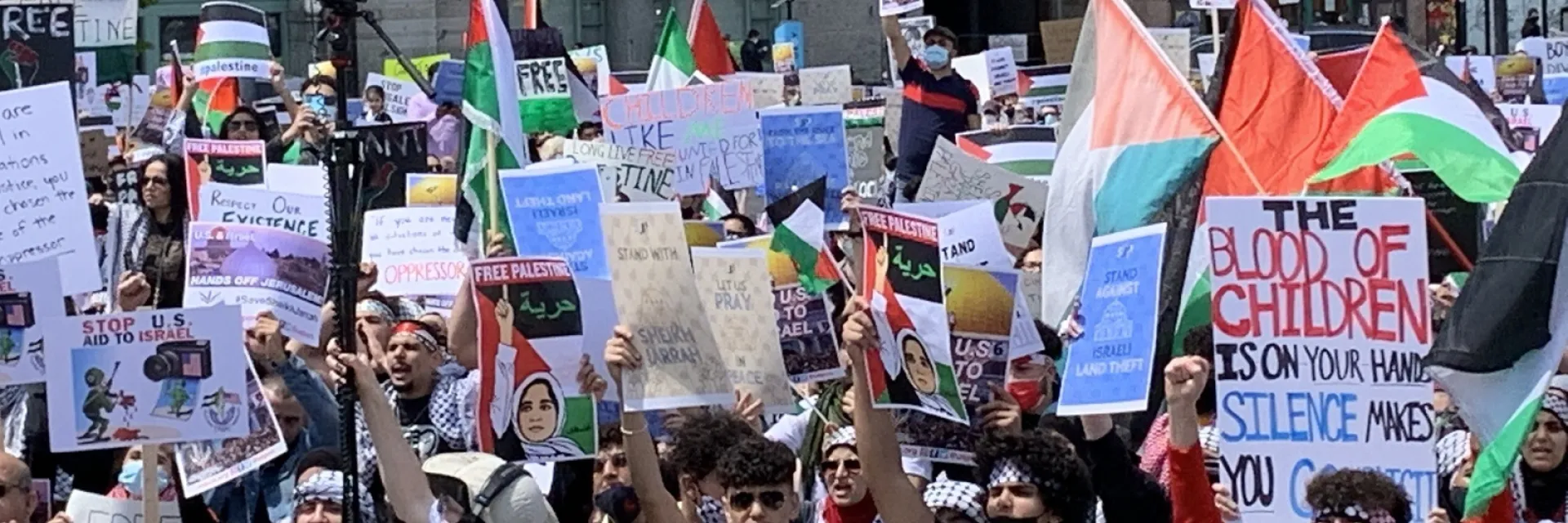“We can’t give Gaza only seasonal attention,” AFSC's Jehad Abusalim said in an interview. “The violence continues. Ending the political isolation of Gaza and trying to make Gaza a place we can imagine living in is our mandate.”
In May 2021, international attention turned to Gaza as Palestinians faced 11 days of Israeli airstrikes. The military assault killed more than 250 Palestinians, injured many more, and caused thousands to flee their homes.
Today, the U.S. and international community must refocus efforts to address the longstanding injustices that have impaired prospects for all people to live in safety and peace. That includes calling for an end to the Israeli occupation and blockade of Gaza.
“We can’t give Gaza only seasonal attention,” AFSC's Jehad Abusalim said in an interview. “The violence continues. Ending the political isolation of Gaza and trying to make Gaza a place we can imagine living in is our mandate.”
The May 2021 attacks caused widespread destruction of homes, businesses, and infrastructure. Reconstruction efforts and conditions in Gaza remain dire.
Palestinians in Gaza still live in temporary shelters as their homes remain uninhabitable. Water wells, sewage systems, and solar panels still need repair. Health services remain disrupted as COVID testing centers, clinics, hospitals, and pharmacies were damaged or destroyed. Patients continue to be denied access to medical treatment outside of Gaza. Many people do not have access to clean water. Electricity is only available for about half the day. Agricultural lands, factories, and shops were destroyed, worsening an economy already in crisis.
Israeli restriction on imports is one of the key obstacles to reconstruction in Gaza. In a January 2022 report, the Israeli nonprofit organization GISHA wrote: “Israel has restricted the entry of construction materials, raw materials, chemicals, equipment, and spare parts into Gaza that are needed for industry, the health sector, and civilian infrastructure. Israel considers thousands of items to be ‘dual-use,’ that is, civilian goods that could also be used for a military purpose, even though these items are not defined as dual-use according to international standards.”
A growing number of people in the U.S. want elected officials to take action by providing humanitarian aid to Palestinians—while calling on the Israeli government to end the illegal collective punishment and blockade of Gaza.
Here are five ways you can join efforts to support Palestinians in Gaza today.
1. Organize in your community to show solidarity with Gaza.
Think creatively about how to express your support. That could include hanging a sign in your window at home or work, coordinating or joining a vigil or demonstration, organizing a fundraiser for relief efforts, or using social media to show your support for Palestine.
Read more from Arab American activist Rosanna Thompson who organized a solidarity vigil in Chicago last fall.
2. Take action by contacting public officials and the media.
Tell Congress: End military aid to Israel and support reconstruction in Gaza.
Every year, Israel is guaranteed at least $3.3 billion in U.S. military financing, under a memorandum of understanding between the two countries. This funding is often supplemented with additional military aid. Israel uses this funding to buy weapons and military resources to enforce its occupation of the Palestinian territory, keep Gaza under blockade, and violate Palestinians’ rights. By continuing to provide Israel with military aid at U.S. taxpayer expense—without demanding accountability for human rights violations—the United States is deeply complicit in Israel’s ongoing and systematic human rights violations.
Ask your representative to support the Palestinian Children and Families Act (H.R. 2590). The U.S. government should end all military aid to Israel and ensure that our taxpayer dollars are not used to fund human rights violations.
Tell media outlets what you think about their coverage of Gaza. Encourage them to challenge the narratives that ignore Palestinian rights—or give praise to coverage when they get it right.
3. Learn more and lift up Palestinian voices.
Check out our list of resources about Gaza—including films, recent articles, books, and websites for more information.
Lift up the voices of Palestinians from Gaza and throughout the occupied Palestinian territory. Share our Facebook interviews with people living in Gaza. And read and share these powerful essays written by Palestinian youth in Gaza for our “Life Under Blockade” booklet.
4. Hold corporations accountable for their role in violating the rights of Palestinians in Gaza.
AFSC’s Economic Activism Program has compiled a list of corporations complicit in Israeli military attacks on Gaza and profit from the Israeli occupation. This list includes companies that supply weapons and surveillance technology to Israel. Ensure your money is not contributing to human rights violations—and call on these companies to end their complicity in apartheid and war crimes.
Visit Investigate to learn more about companies involved in the occupation, and how you can join efforts to divest or boycott them.
5. Make a gift.
Support AFSC’s advocacy for Palestinian rights. Your donation will help fund our work with communities across the U.S. to bring about peace, justice, and human dignity for all people.


